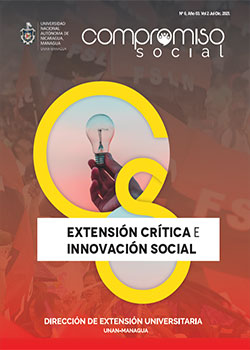Implementation and Sustainability of School Radios in Secondary Education
DOI:
https://doi.org/10.5377/recoso.v3i6.13511Keywords:
School radios, orality, didactics, streamingAbstract
The present work proposes to accompany the start-up of a school radio in the Secondary School No. 25 of the city of Monte Grande in the Esteban Echeverría district, Province of Buenos Aires. It is important to accompany the educational community in the learning process that will allow the actors to achieve a very important territorial practice of community communication. This work will be accompanied by a group that I lead made up of three teachers and three students from the National University Institute of Human Rights, Mothers of Plaza de Mayo, and we will provide training workshops for teaching staff and students. In addition, it will be essential to understand the problems of management and sustainability within the educational context, since it is necessary to approach from the different dimensions that intervene in the development of this activity, both didactic and communicational, for that it is important to take the task into account to collect as much information as possible, to guarantee continuity over time. We understand Extension as a way of building knowledge with the other and in that sense we will try to reflect, think and rethink the operation of future school radios, without thinking about a medium that goes on the air in the conventional way, to start doing it through from a streaming server, allowing better and more up-to-date accessibility; since nowadays radio listening is done via applications on cell phones or computers. vision that permeates its entire history is the belief in knowledge and the free use of reason as bases for the building up of human society. That is why the university seeks to preserve the knowledge accumulated by humanity and that belief is the basis of its intervention in the present and the acceptance of the questions of the future. Without that, another would be the civilizational course of humanity. We would be surrendering to the obscurantism that confronts us in current times.
Downloads
References
Barco de Surghi (1988), Estado actual de la pedagogía y la didáctica, en Revista Argentina de Educación, Nº 12, Buenos Aires.
Barnett, R. (2001) Los límites de la competencia. Barcelona: Gedisa.
Bourdieu, P. (1980). El Sentido Práctico. Barcelona: Taurus.
Catalano, A. M.; Avolio de Cols, S.; Sladogna, M. (2004) Diseño curricular basado en normas de competencia laboral: conceptos y orientaciones metodológicas. Buenos Aires: BID/FOMIN; CINTERFOR.
Davini, M.C. (2015) La formación en la práctica docente. Buenos Aires: Paidós, 2015
Díaz, Barriga, A. (1992) Lo metodológico: un problema sin respuesta, en: Didáctica y currículum. Nuevomar, México, 14 Edición.
Eco, Umberto (2001) Cómo se hace una tesis. Técnicas y procedimientos de estudios, investigación y escritura. Editorial Gedisa, Barcelona.
Edelstein, G. (1996) Un capítulo pendiente: el método en el debate didáctico contemporáneo, en: Camilloni, A. y otras. Corrientes didácticas contemporáneas. Paidós, Buenos Aires.
Furlan, A. (1989) Aportaciones a la Didáctica de la Educación Superior. México: ENEPI- UNAM.• Geertz, C. (1989). La Interpretación de las Culturas. Barcelona: Gedisa
Martin, M.V. (2008) “Hacia una nueva configuración socio-cultural: los SMS”. Ponencia en el III Congreso Internacional: “Transformaciones culturales. Debates de la teoría, la crítica y la lingüística”, Facultad de Filosofía y Letras, UBA. Buenos Aires, 4, 5 y 6 de agosto.
Martin, MV (2017) “¿Consumidores o sujetos de derecho? La educación, entre las TIC y las TEP”. Apuntes de comunicación, educación y discurso (No. 2), e009, noviembre 2017 ISSN 2525-2046 | https://doi.org/10.24215/25252046e009 http://perio.unlp.edu.ar/ojs/index.php/apuntes FPyCS | Universidad Nacional de La Plata Buenos Aires,| Argentina
Martin M.V. (2018) “Las mediaciones TIC y el despoder social en Educación”, en La aventura de innovar con TIC II: aportes conceptuales, experiencias y propuestas, Ebook, ISBN 978-950-34-1711-9. La Plata: Universidad Nacional de La Plata. Págs. 21- 27. En línea: bit.ly/32ARSvA
Martin M.V. (2018) “La escuela frente a las nuev@s formas de leer, escribir y publicar”. Catalejos. Revista sobre lectura, formación de lectores y literatura para niños. Vol. 2; Nº. 3, diciembre de 2016. ISSN (en línea): 2525-0493. (pp. 84-101).
Mastache A (2007) Formar personas competentes. Buenos Aires: Noveduc.
Ruvalcaba Flores (2013) La didáctica en el enfoque por competencias. Revista Certus. Recuperado de: http://genesis.uag.mx/certus/vol17/didactica.html
Schwab, J. (1983) Un lenguaje práctico como lenguaje para el currículum, en Gimeno Sacristán, J. y Pérez Gómez: La enseñanza: su teoría y práctica.Madrid. Akal Universitaria
Downloads
Published
How to Cite
Issue
Section
License
Copyright (c) 2021 Universidad Nacional Autónoma de Nicaragua, Managua (UNAN-Managua)

This work is licensed under a Creative Commons Attribution-NonCommercial-ShareAlike 4.0 International License.




